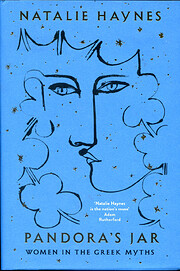

Auf ein Miniaturbild klicken, um zu Google Books zu gelangen.
|
Lädt ... Pandora'sJar
Werk-InformationenPandora's Jar: Women in the Greek Myths von Natalie Haynes
 Keine aktuelle Diskussion zu diesem Buch.   ) )Audiobook read by the author I've listened to her Stands Up For series on the BBC, so I thought I'd get this. Enjoyed the hell out of it and listened to it twice! It's a feminist take on the representation of women in Greek myths - but with humor! I had to check my childhood book of myths and legends to make sure my memory of Pandora holding a jar instead of a box was correct. It was. So, if you don't take anything else from this book, be sure it's that it was a JAR and not a box. Other major characters discussed are Phaedra, Helen, Jocasta, Amazons in general, Clytemnestra (what's with the "C," Natalie?), ummm, Medea, Euridice, Medusa, and Penelope. The audio from Audible also had a pdf with a list of the illustrations she discussed listed. This caused me to pick up my copy of Hesiod to read. Anyway, absolutely delightful and can't wait for her next book, although I'm afraid the current BBC series has spoilers. Oh well. It is always interesting to take a closer look at ancient myths. In this book, we explore the stories of some of the most famous women from Greek mythology - in great detail. Their stories have also been diminished and warped through retellings, and not (always) by Ancient Greeks. It was great to see these women in all their complexity and ask questions not usually asked in "regular" retellings of Greek myths. The book is cheerfully, sarcastically feminist! I especially enjoyed diving into how the myths were told by Euripides, Sophocles, Ovid, Virgil... Also, any author who can successfully and seamlessly transfer from Euripides to Star Trek makes my inner geek jump for joy. A reexamination of some of the women without whom many of the ancient myths would be very different, in spite of predominantly being centered on the men who raped, killed, married, and cheated on them. It is primarily Euripides whose extant plays give some of them distinct and powerful voices in ancient times, however much they have been erased or altered since. A brilliant tour by British classicist Natalie Haynes through the tales of ten women from Greek mythology, exploring how the dominant versions came to be that way, alternate interpretations of these women, and contemporary reinterpretations. It's smart, funny, and a perfect read for someone like me who has been fascinated by Greek myths since elementary school. Recommended.
With Pandora’s Jar, [Haynes] returns to nonfiction to examine the origin stories and cultural legacies of the best-known women of classical literature, with the characteristic blend of scholarship and sharp humour that will be familiar to fans of her Radio 4 show, Natalie Haynes Stands Up for the Classics. Auszeichnungen
The national bestselling author of A Thousand Ships returns with a fascinating, eye-opening take on the remarkable women at the heart of classical stories Greek mythology from Helen of Troy to Pandora and the Amazons to Medea. The tellers of Greek myths-historically men-have routinely sidelined the female characters. When they do take a larger role, women are often portrayed as monstrous, vengeful or just plain evil-like Pandora, the woman of eternal scorn and damnation whose curiosity is tasked with causing all the world's suffering and wickedness when she opened that forbidden box. But, as Natalie Hayes reveals, in early Greek myths there was no box. It was a jar... which is far more likely to tip over. In Pandora's Jar, the broadcaster, writer, stand-up comedian, and passionate classicist turns the tables, putting the women of the Greek myths on an equal footing with the men. With wit, humor, and savvy, Haynes revolutionizes our understanding of epic poems, stories, and plays, resurrecting them from a woman's perspective and tracing the origins of their mythic female characters. She looks at women such as Jocasta, Oedipus' mother-turned-lover (turned Freudian sticking point), who gouged out her eyes upon discovering the truth about her new relationship, and was less helpless than we have been led to believe. She considers Helen of Troy-whose face famously "launch'd a thousand ships," but was decidedly more child than woman when she was accused of "causing" the Trojan war. She demonstrates how the vilified Medea was like an ancient Beyonce-getting her revenge on the men who hurt and betrayed her, perhaps justifiably so. And she turns her eye to Medusa-the serpent-like seductress whose stare turned men to stone-who wasn't always a monster, and was far more victim than perpetrator. Pandora's Jar brings nuance and care to the centuries-old myths and legends and asks the question: Why we were so quick to villainize these women in the first place-and so eager to accept the stories we've been told? Keine Bibliotheksbeschreibungen gefunden. |
Aktuelle DiskussionenKeineBeliebte Umschlagbilder
 Google Books — Lädt ... Google Books — Lädt ...GenresMelvil Decimal System (DDC)292.211Religions Other Religions Classical religion (Greek and Roman religion) Theological Orientations and Doctrines Various Objects of Worship Gods & GoddessesKlassifikation der Library of Congress [LCC] (USA)BewertungDurchschnitt: (4.26) (4.26)
Bist das du?Werde ein LibraryThing-Autor. |
|||||||||||||||||||||||||||||||||||||||||||||||||||||||||||||||||||||||||||||||||||||||||||||||||||||||||||||||||||||||||||||||||||||||||